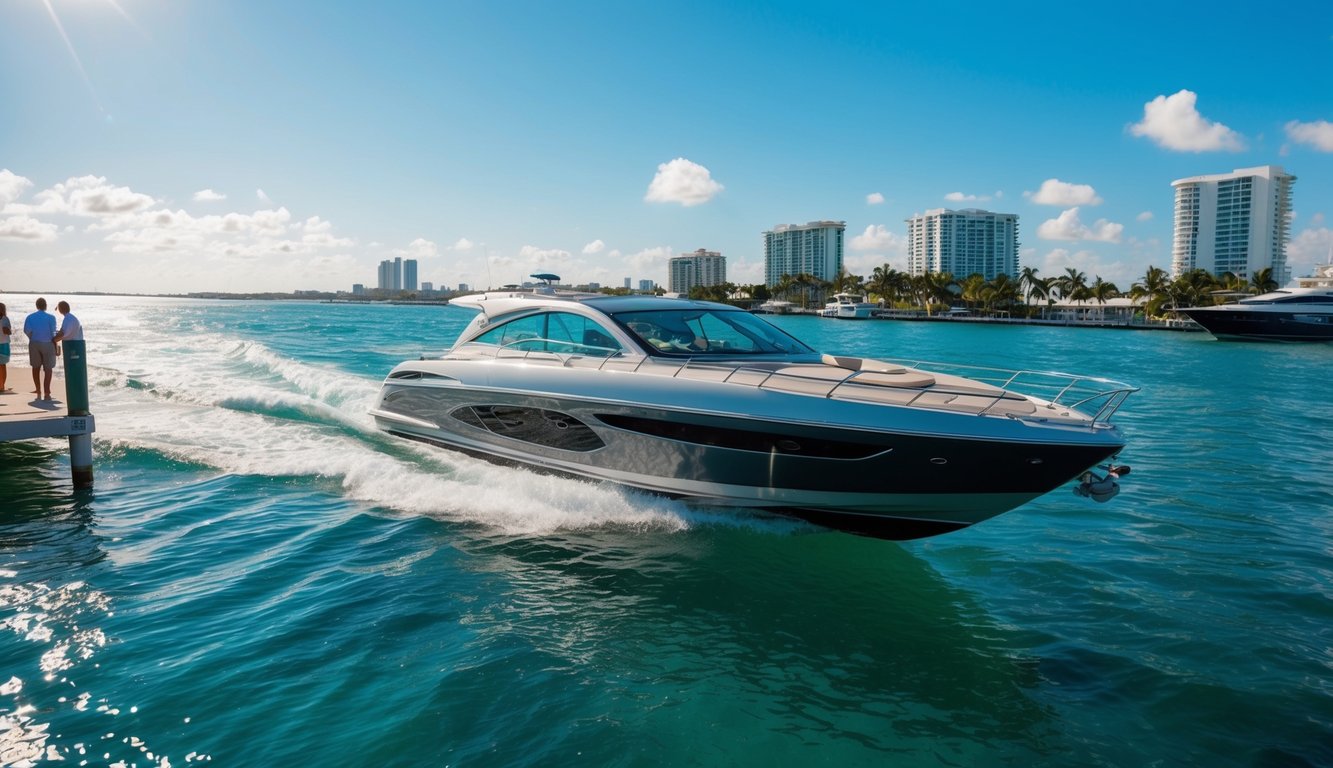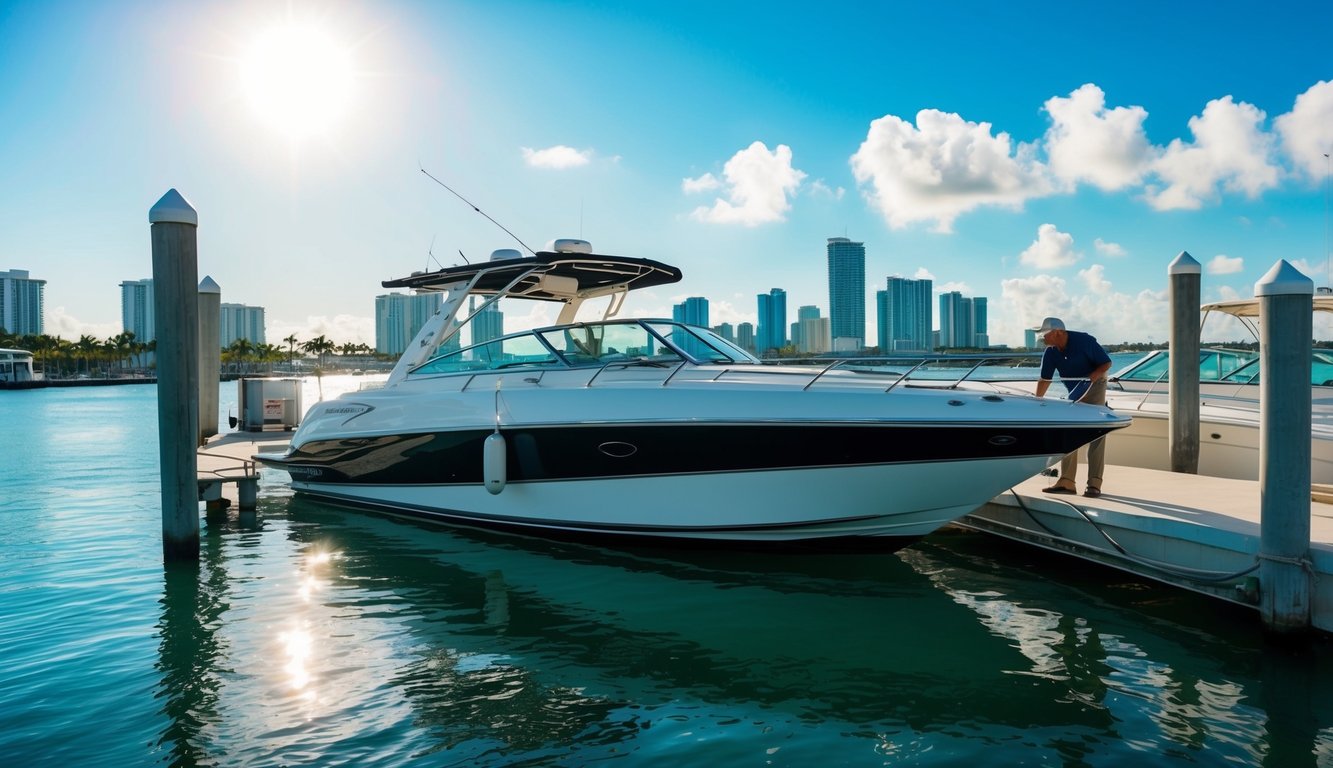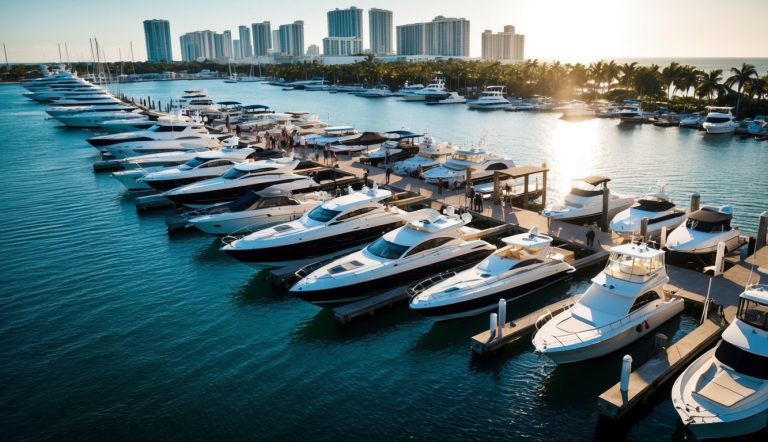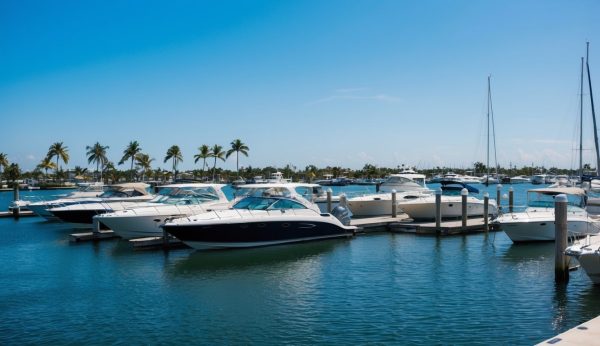Miami’s boating scene is one of the most vibrant in the United States. With year-round sunshine and miles of coastline, it’s no surprise that boat ownership is popular here. The Miami boat market is highly competitive, with thousands of boats for sale at any given time. Understanding this market is key when you’re planning to sell your vessel. Let’s explore the world of boat selling in Miami!
Market values in Miami tend to be higher than in many other parts of Florida. This is good news if you’re selling, as you might command a better price for your boat. Seasonal trends affect boat sales significantly. Winter months (December-February) often see an influx of buyers from northern states looking to purchase vessels for the warmer months.
Different types of boats sell at different rates in Miami:
- Sport fishing boats: High demand year-round
- Center consoles: Popular for day trips
- Luxury yachts: Slower to sell but higher value
- Pontoon boats: Steady family market
When selling a boat in Miami, timing matters. Spring and early summer typically offer the best selling opportunities as buyers look to enjoy the upcoming season. The yacht sales market in Miami is particularly strong, with international buyers often looking for luxury vessels.
Used boat values have increased in recent years due to supply chain issues affecting new boat production. This creates a favorable environment for sellers with well-maintained vessels. Platforms like Facebook Marketplace and Craigslist offer direct access to local buyers, while specialized boat listing sites attract serious shoppers from around the country.
Choosing the Right Selling Method

When selling your boat in Miami, selecting the appropriate selling method can significantly impact how quickly you sell and at what price. Your choice affects everything from marketing reach to the final selling price.
Broker vs. Private Sale
- Hiring a yacht broker offers several advantages for boat owners in Florida. Brokers handle the entire sales process, from pricing to paperwork. They typically charge a commission of 10% on the final sale price, but they bring expertise in setting fair market prices.
- Brokers provide access to extensive networks of qualified buyers. They also manage showings, negotiations, and complex paperwork requirements specific to Florida boat sales.
- A private sale gives you complete control and eliminates commission costs. However, you’ll need to handle all marketing, showings, and legal documentation yourself.
- Choose a broker if you value convenience and professional service. Select private selling if you have experience, time, and want to maximize your profit.
Listing Platforms and Local Markets
Miami offers numerous platforms to showcase your boat to potential buyers. Online marketplaces like Boats.com and YachtWorld.com connect you with national and international buyers.
Local options include:
- Miami boat shows and exhibitions
- Marina bulletin boards
- Local boating clubs
- Facebook Marketplace and regional groups
Creating an effective listing is crucial. Include:
- High-quality photos (both interior and exterior)
- Detailed specifications (length, engine hours, equipment)
- Maintenance records
- Recent upgrades
Consider professional detailing services before taking photos. A clean, well-presented boat attracts more serious buyers and commands higher prices. The Miami market has seasonal fluctuations. Spring and early summer typically see increased demand as buyers prepare for boating season.
Preparing Your Boat for Sale

Getting your boat ready for the market significantly impacts how quickly it sells and the price it commands. A well-prepared vessel attracts serious buyers and showcases your boat’s true value.
Cleaning and Maintenance
First impressions matter when selling a boat. Start with a thorough cleaning from bow to stern. Remove all personal items and clutter to make spaces appear larger and more inviting.
Focus on these key areas:
- Exterior: Wash and wax the hull, clean windows, and polish all metal
- Interior: Vacuum carpets, wipe surfaces, and eliminate any odors
- Engine compartment: Clean thoroughly as buyers will inspect this carefully
Address mechanical issues before listing. Fix any problems with the engine, electrical systems, or plumbing. Consider having a professional service completed with documentation to show potential buyers. Replace worn upholstery or cushions if they detract from your boat’s appearance. Small investments in maintenance can yield significant returns in your final selling price.
Staging for Showings
When preparing for viewings, think like a buyer seeing your boat for the first time. De-clutter completely and remove all personal belongings that aren’t essential boat equipment.
Stage your boat to highlight its best features:
- Position cushions neatly
- Ensure all cabinets and storage areas are organized
- Remove unnecessary equipment that makes spaces look cramped
Take high-quality on-water photos and videos that showcase your boat in action. These visuals help buyers envision themselves enjoying your vessel. For in-person showings, arrive early to air out the cabin and ensure everything is clean and functioning. Have maintenance records and vessel documentation organized and ready to show interested buyers.
Consider the time of day for viewings—morning light often shows boats at their best advantage while avoiding harsh midday sun.
Setting the Right Price

Setting the right price for your boat is crucial when selling in Miami’s competitive market. A well-priced boat attracts serious buyers and sells faster.
Research the market value first. Look at similar boats in your area to understand what buyers expect to pay. The price you set should reflect your boat’s condition and current market conditions.
Consider these factors when pricing your boat:
- Age and model
- Engine hours
- Overall condition
- Recent upgrades
- Maintenance history
- Season (summer prices are typically higher)
Be realistic about your boat’s value. Overpricing can lead to your listing being ignored, while underpricing means leaving money on the table. For used boat sales, expect buyers to negotiate. Many sellers set their price as firm but include some cushion for negotiation.
Yacht sales require special consideration. Larger vessels often have unique features that affect valuation. Professional appraisals can be worthwhile for higher-end boats. Determining the right asking price requires careful consideration. You can use online valuation tools, consult with brokers, or review recent sales of similar models.
Remember that a clean, well-maintained boat commands a better price. Before listing, make necessary repairs and give your boat a thorough cleaning to maximize its value.
Marketing Your Boat Effectively

Marketing plays a crucial role in attracting potential buyers to your boat. Effective promotion strategies can significantly reduce your selling time and help you get the best price possible.
Professional Listings and Photography
High-quality listings are essential when selling your boat. Clear, professional photographs are non-negotiable in today’s digital marketplace. Take multiple well-lit images showing your boat from different angles, including the interior, engine, and any special features.
When creating your listing, include:
- Detailed specifications (length, year, make, model)
- Engine hours and maintenance history
- Recent upgrades or renovations
- Clear pricing and location information
Working with a broker can simplify this process. Professional brokers have access to premium listing platforms and can highlight your boat’s best features to attract serious buyers. Remember to thoroughly clean and detail your boat before taking photos. A spotless vessel suggests proper maintenance and care, making your boat more appealing to potential buyers.
Using Social Media and Boating Forums
Social media platforms provide powerful tools for marketing your boat to a wide audience. Create engaging posts on Facebook, Instagram, and YouTube showcasing your vessel in action. Short videos of your boat cruising can be particularly effective in generating interest. Boating forums and specialized websites are excellent places to advertise your yacht for sale. Sites like Boat Trader, YachtWorld, and local Miami boating groups connect you directly with motivated buyers already in the market.
When posting on forums, be transparent and responsive. Include:
- All relevant specifications
- Your asking price (avoid “price on request”)
- Your location in Miami
- Contact information for inquiries
Don’t underestimate word-of-mouth marketing. Tell friends, family, and fellow boaters that your vessel is for sale. The boating community is tight-knit, and personal recommendations often lead to successful sales.
Navigating Legal and Financial Transactions

Selling your boat in Florida involves several legal and financial steps that require careful attention. Understanding these processes helps ensure a smooth transaction and protects both parties from potential issues.
Contract and Negotiation Tactics
Creating a solid purchase agreement is crucial when selling your boat in Miami. The contract should clearly outline all terms including price, deposit amount, inspection timeline, and contingencies.
Key elements to include in your contract:
- Detailed vessel description with HIN (Hull Identification Number)
- Purchase price and payment terms
- Condition of sale (as-is or with warranties)
- Timeline for closing the transaction
- Inspection and sea trial terms
Be prepared to negotiate on price, but remain firm on your bottom line. Consider having a sales plan before negotiations begin. Many sellers in Miami find working with a broker beneficial during this phase, as they can serve as an intermediary. Remember to document all verbal agreements in writing. This protects you and provides clarity if disputes arise later.
Handling Payment and Financing
Secure payment methods are essential when selling your boat in Florida. Never release ownership until full payment is confirmed and cleared.
Acceptable payment methods:
- Wire transfers (most secure)
- Cashier’s checks (verify with issuing bank)
- Escrow services (third-party protection)
If your buyer needs financing, be prepared for additional steps. Lenders may require a marine survey and insurance verification before approving the loan. This can extend your timeline by 2-4 weeks. Consider using a broker’s trust account to handle financial transactions. This provides security for both parties and ensures funds are properly managed. Broker commissions typically range from 5-10% in Miami but may be negotiable.
Title Transfer and Tax Implications
Transferring boat ownership in Florida requires specific documentation to be completed properly. You must provide a signed title and bill of sale to the buyer.
Required documentation:
- Signed title transfer
- Notarized bill of sale
- Satisfaction of any liens
- Registration documents
Florida charges a 6% sales tax on boat sales, but there are exceptions. If the buyer is from out-of-state or plans to move the vessel out of Florida, they may qualify for exemptions. Be aware that vessels over 32 feet sold by individuals may require a maritime attorney to handle the closing. This ensures all documentation is properly prepared and filed with appropriate authorities.
Document all fees paid and keep copies of all transaction records for tax purposes. The IRS may require proof of the sale amount when you file your annual return.
Closing the Deal Successfully

The final stages of selling your boat require careful attention to detail and proper documentation. Successful closings depend on thorough testing, clear communication, and handling all paperwork correctly.
Conducting a Sea Trial
- A sea trial is often the make-or-break moment when selling your boat. Prepare your vessel thoroughly before the buyer arrives. Clean the boat, check all systems, and ensure everything is in working order.
- During the trial, allow the buyer to operate the boat while you point out special features. Be ready to answer questions about handling, maintenance history, and performance.
- Most sea trials last 1-2 hours. Yacht brokers can help facilitate this process if you’re uncomfortable conducting it yourself. Some sales may involve an “offshore closing” where the boat is sailed into international waters on closing day for tax advantages.
- If mechanical issues arise during the trial, address them honestly. Trust is essential in boat sales.
Final Inspections and Warranty Transfers
Before finalizing the sale, the buyer will likely request a marine survey or mechanical inspection. This professional assessment helps verify the boat’s condition and value. Be present during inspections and have maintenance records available. If repairs are needed, you may negotiate price adjustments or agree to fix issues before closing.
When trading in your boat, a dealer will handle much of this process. For private sales, you’ll need to:
- Transfer the title properly
- Provide all owner’s manuals and documentation
- Transfer any remaining warranties
- Complete a bill of sale
- Remove personal items and electronics not included in the sale
Many boat manufacturers allow warranty transfers to new owners. Contact the manufacturer to understand their specific transfer requirements and fees.



